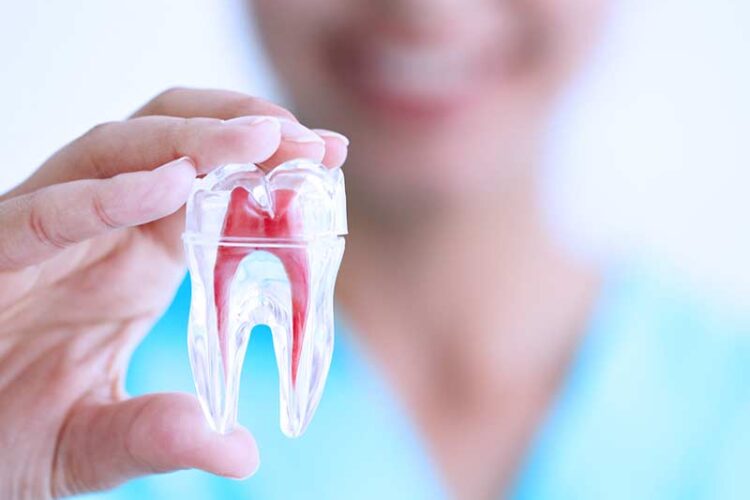


ROOT CANAL THERAPY Grover Beach, CA
Restore and Save Your Tooth with a Root Canal
Pain and sensitivity is common when you have an infection in your tooth structure - including the root. Root canal therapy targets the infection and saves your tooth from being extracted.

Reconsider what you’ve heard about root canal treatment
There’s a lot of misunderstanding around root canals. Opinions aside, root canal treatment isn’t always a painful procedure.
During Root Canal Therapy
-
Sedation is available to assure your comfort.
-
You’ll likely notice that your previous pain is gone following the treatment.
Know your root canal symptoms
A noticeable infection or ongoing tooth pain are symptoms you shouldn’t ignore. Your tooth structure and the surrounding gum tissue can experience further damage if your symptoms persist.
-
Tooth discoloration
-
Swelling, redness, or bleeding in your gums surrounding your tooth
Your tooth can be saved
Root canal therapy focuses on the cause of your tooth infection. The treatment removes the infection, prevents it from becoming worse, and promotes healing.
It’s important to follow care instructions to ensure a comfortable recovery period after a root canal.
-
Avoid heavy chewing or eating hard, sticky foods
-
Be gentle as you brush and floss on or around the treated area
-
Use recommended over-the-counter pain medication to deal with any pain or discomfort
-
Follow post-treatment instructions and use prescribed antibiotics
-
Contact our Grover Beach dental office about any complications or extended discomfort
Schedule an examination and consultation with your Grover Beach dentist to discuss saving your tooth with root canal therapy.
Patients Experience
 Pete A.I am glad I found this office. Whitecrest is the best dental office I've been, ever. Dr. Perez is very kind and he took good care of me. He also educated me about my dental health. And the staff makes you feel extremely welcome, they are loving and adorable people. Thank you Whitecrest!!! 😁read moreread less
Pete A.I am glad I found this office. Whitecrest is the best dental office I've been, ever. Dr. Perez is very kind and he took good care of me. He also educated me about my dental health. And the staff makes you feel extremely welcome, they are loving and adorable people. Thank you Whitecrest!!! 😁read moreread less Dawson M.I have been going to WhiteCrest for two years now and would highly recommend them. The staff is super friendly and professional and makes you feel welcome and comfortable. The equipment is state of the art as well, and Dr. Perez is skillful and has good communication skills. If you’re new to the 5 Cities or looking for a new dentist be sure to check this place out.read moreread less
Dawson M.I have been going to WhiteCrest for two years now and would highly recommend them. The staff is super friendly and professional and makes you feel welcome and comfortable. The equipment is state of the art as well, and Dr. Perez is skillful and has good communication skills. If you’re new to the 5 Cities or looking for a new dentist be sure to check this place out.read moreread less John S.WhiteCrest-Smart Dentistry is the best dentist that I have ever had! Not only does Dr. Perez provide excellent dental service, the staff put the time and effort to ensure that your experience is a positive one. Look no further, I would recommend WhiteCrest-Smart Dentistry to anyone living on the Central Coast.read moreread less
John S.WhiteCrest-Smart Dentistry is the best dentist that I have ever had! Not only does Dr. Perez provide excellent dental service, the staff put the time and effort to ensure that your experience is a positive one. Look no further, I would recommend WhiteCrest-Smart Dentistry to anyone living on the Central Coast.read moreread less Reyes d.Dentists give me a ton of anxiety. But Dr. Perez and his team did an absolute fantastic job settling my nerves and making me feel comfortable. I had a root canal done and was terrified… not anymore! I’m so glad I found them and have established White Crest as my dentistry! Would recommend to anyone looking for a dentist 😁read moreread less
Reyes d.Dentists give me a ton of anxiety. But Dr. Perez and his team did an absolute fantastic job settling my nerves and making me feel comfortable. I had a root canal done and was terrified… not anymore! I’m so glad I found them and have established White Crest as my dentistry! Would recommend to anyone looking for a dentist 😁read moreread less Valerie l.The staff is great, very sweet people. The dr is professional and friendly. I’m so grateful for the people here. My smile was something I always hid and lived so long with that I actually forgot how to smile. After a few appointments with this place I can happily say that I smile all the time without shame.read moreread less
Valerie l.The staff is great, very sweet people. The dr is professional and friendly. I’m so grateful for the people here. My smile was something I always hid and lived so long with that I actually forgot how to smile. After a few appointments with this place I can happily say that I smile all the time without shame.read moreread less Melissa V.I cannot say enough incredible things about this dentistry. Staff and Dr are very welcoming and kind. I have had no problems getting appointments scheduled within a reasonable time. Dr and staff always ensure I am well-informed and try to get the most out of my insurance. I have had a lot of fear from past dental experiences, but the approach of this office to their care is genuine. I definitely recommend their services.read moreread less
Melissa V.I cannot say enough incredible things about this dentistry. Staff and Dr are very welcoming and kind. I have had no problems getting appointments scheduled within a reasonable time. Dr and staff always ensure I am well-informed and try to get the most out of my insurance. I have had a lot of fear from past dental experiences, but the approach of this office to their care is genuine. I definitely recommend their services.read moreread less Fabiola V.Staff is super friendly and professional. I’m so glad I discovered Dr. Raul’s office. I took my mom for an emergency and they made space to see us immediately, when in Santa Maria we visited more than 5 dentists without success. When I saw the job and attention on my mom I made a schedule for myself. The doctor and his assistant talk you through the procedure while working on you and ask you if you’re feeling okay and make sure you’re doing good. They take all the safety measures, even checking your pressure before the anesthesia, and show you educational videos on how to take care of your teeth at the end of your visit. The doctor and office staff are bilingual and talk Spanish. Now all my family is coming to White Dentistry! 100000 stars!!read moreread less
Fabiola V.Staff is super friendly and professional. I’m so glad I discovered Dr. Raul’s office. I took my mom for an emergency and they made space to see us immediately, when in Santa Maria we visited more than 5 dentists without success. When I saw the job and attention on my mom I made a schedule for myself. The doctor and his assistant talk you through the procedure while working on you and ask you if you’re feeling okay and make sure you’re doing good. They take all the safety measures, even checking your pressure before the anesthesia, and show you educational videos on how to take care of your teeth at the end of your visit. The doctor and office staff are bilingual and talk Spanish. Now all my family is coming to White Dentistry! 100000 stars!!read moreread less Tiffany G.First off, let me begin by saying I NEVER write reviews -- but after my experience with Dr. Perez, I felt it was the only right thing to do seeing as he has changed my outlook on dentists all together. Dr. Perez is the BEST dentist in the Central Coast-- not just for people who are VERY fearful of getting dental work done like myself, but also because he is a grade A professional at his craft. I Went into his office and was greeted by a very friendly staff and felt comfortable through the entire process. He knew I had a fear from a past experience so he talked me through the whole thing and the remaining staff accommodated relaxing music, essential oils, and a positive energy presence . They are extremely flexible with my work schedule when making appointments and much more. I am very blessed to have found such a wonderful Dentist locally. I look forward to my next appointment!read moreread less
Tiffany G.First off, let me begin by saying I NEVER write reviews -- but after my experience with Dr. Perez, I felt it was the only right thing to do seeing as he has changed my outlook on dentists all together. Dr. Perez is the BEST dentist in the Central Coast-- not just for people who are VERY fearful of getting dental work done like myself, but also because he is a grade A professional at his craft. I Went into his office and was greeted by a very friendly staff and felt comfortable through the entire process. He knew I had a fear from a past experience so he talked me through the whole thing and the remaining staff accommodated relaxing music, essential oils, and a positive energy presence . They are extremely flexible with my work schedule when making appointments and much more. I am very blessed to have found such a wonderful Dentist locally. I look forward to my next appointment!read moreread less Alvaro C.NO PAIN!, HIGHLY RECOMMENDED !, AMAZING DENTIST AND TEAM! PATIENCE WITH ME AND MY TEETH My experience with this team of dentists was great and I don't want to keep it to myself. my teeth were years without maintenance, they deteriorated with some cavities and some old root canals The WHITE CREST team guided me through the procedure and with their modern technology they found and solved all my denture problems. Best of all, I didn't feel pain at any time. I am happy with Dr. Raul Perez and I want to share it with you.read moreread less
Alvaro C.NO PAIN!, HIGHLY RECOMMENDED !, AMAZING DENTIST AND TEAM! PATIENCE WITH ME AND MY TEETH My experience with this team of dentists was great and I don't want to keep it to myself. my teeth were years without maintenance, they deteriorated with some cavities and some old root canals The WHITE CREST team guided me through the procedure and with their modern technology they found and solved all my denture problems. Best of all, I didn't feel pain at any time. I am happy with Dr. Raul Perez and I want to share it with you.read moreread less
REQUEST AN APPOINTMENT
Schedule Your Next Dental Visit
Fill out the form below and we will contact you shortly. If you have a dental emergency please call us. We look forward to caring for you.

